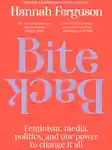ADVANCING EQUALITY THROUGH THE EDUCATION AND EMPOWERMENT OF WOMEN AND GIRLS IS THE FOCUS OF OUR SOCIAL CHANGE INITIATIVE, MECCA M-POWER.
When Hannah Ferguson enrolled in a law degree, she had no interest in pursuing a career in the legal field – it was simply a path she felt she 'needed' to walk down: “From a young age, I based a lot of my worth around the marks I got at school. When you don’t know what you want to do at university, often you’re drawn towards the things that sound impressive, not necessarily knowing what you want to do with your life. For me, it felt like, 'I got the mark, so I need to do the thing that’s hard,'” she explains.
And while she finished her degree, she never enjoyed her studies. “It wasn’t the content I hated, it was the culture of law school,” Ferguson reveals. “It was the stuffy, marks-driven ego of it all.”
As you’ve probably noticed, Ferguson isn’t afraid to speak her mind; at 22, she founded Cheek Media, a platform for daring feminist opinions on everything from right-wing politics to overcoming taboos around sex and pleasure. Now, she’s published her first book – fittingly titled Bite Back.
However, Ferguson still describes herself as an “overachieving people-pleaser.” So, how does that work alongside running such an outspoken platform? “I don’t think I’ve ever met someone who’s not in some way tied to the opinions of others, because it's so human, right?" she says.
"It’s human to want connection, and a lot of what drives connection is feeling like we need to appease others. It’s interesting because it’s not what belonging is – fitting into someone else’s mould of what you think they want isn’t actually connection.”
She makes a good point – and it’s this mindset that gives her the confidence to speak loudly about the issues that matter most to her. “I’m willing to go against the grain and say the things that no-one’s saying,” Ferguson says. “I'm an intense person, I always have been.”
She’s also wise beyond her years and can talk about anything from politics to pop culture. Somehow, we land on an even deeper subject – happiness. “It’s our job to work on happiness every single day, and work on feeling fulfilled and proud of ourselves. It’s a very individual thing. It’s not something that someone else can provide you,” she explains.
Not unrelated is the topic of social media. “People are just projecting one image they want people to see. I’m never claiming to be truly authentic online, because we all have personal lives and we all have things we don’t share,” says the writer, who lists her twenties as a turning point in her mindset – during which those themes of connection, authenticity and appeasing others all coalesced.
“I think you stop pandering to what the world wants you to post. Some people continue down the path, but I think there’s a realisation period after high school that we should engage with each other. With social media, we’re always available. I’ve really struggled with always feeling like I need to instantly reply or when someone doesn’t reply instantly to me, I'm like, ‘Something's wrong.’
"This inability to be unavailable and to switch off and to actually live your life away from your phone and the performance of social media, it’s a recurring conversation. People are starting to separate themselves once more and be more purposeful with how they use their social media,” she explains.
Prior to founding her own media company, Ferguson worked at the Office of the Director of Public Prosecutions, which transformed her perception of crime, the justice system, and the media’s portrayal of it.
“One in four girls and one in six boys will be sexually abused before they become an adult. Those stats mean that in every classroom, in every school playground, it’s someone you know. I don’t think we ever come to terms with the fact that it is happening around us,” she says.
In Bite Back, Ferguson explores how home is supposed to be a place of safety, yet the reality is that the most dangerous place for a child, or a woman, is, in fact, their home.
“There are so many statistics: 2 million Australian girls will be sexually assaulted before they turn 16; 1.5% of sexual assaults result in a conviction; 97% go unreported. We’ve got this pipeline where people just completely drop off, and you can understand why. When you're looking at the media and a story like Brittany Higgins, for example, not only are you seeing someone being re-traumatised by having to speak about the worst thing that’s ever happened to them, but you're seeing the way that that can take years to unfold,” she says.

Cheek Media came about while Ferguson was volunteering at a feminist not-for-profit. “I felt like I wasn’t feminist enough,” she reflects. It spurred something inside her and she founded the company at the end of 2020.
How does she feel when people describe her as ambitious? “I love the word ‘ambitious.’ I feel like the one that bothers me more is actually, ‘You’re overachieving,’ because I’m like, ‘I’m just achieving. You think it’s over, but is that because you’re comparing yourself? Or is that because you feel like I’m not worthy of what I’m doing?’
"I have a really good relationship with the word ‘ambitious’ because I've always been ambitious. I've always been the person that's like, ‘Do everything, try everything once.’ I never want to get to the end of my life and think I was too scared to have a go at something when I had the opportunity.
"I have so much privilege right now, that things are being offered to me. Yes, it’s about passing the mic when necessary and saying no to the things when you shouldn't be the centre. If someone is bothered by my ambition, it says more about them than it does about me.”
In Bite Back, Ferguson dives deep into intersectional feminism. “Women are not one homogenous group. We are not like this monolithic thing. And people’s different marginalisations can interlock and compound to make their experience and the risk they face in the world of abuse, harassment, and discrimination, more significant – and the ways they experience those more severe," she says.
"Intersectionality is about understanding that as a white woman, I am much more privileged and closer to men, in many ways, than I am to other women. It’s about saying that I can cause the harm I’m claiming to be fighting against. Intersectional feminism is something that looks to bring everyone forward, not increase the privileges of white women without focusing on equality and equity for women,” she says.
As a fierce feminist, what does beauty mean to her? Ferguson has a lot to say on the topic. "I’m prepared to be painfully honest: I have had a really bad time with my skin over the last two or three months. I’ve never had severe acne before, but about two or three months ago, I started getting bad eczema and acne on my face. I’ve never been someone who’s been particularly good at makeup or beauty, but I really like doing it,” she adds.
“I wanted to develop my ability to do makeup, my ability to develop a sense of style and feel confident in myself. Because I think that, at the end of the day, we can’t ignore the fact that when we feel good, we perform better. That’s it for me. When I feel attractive to myself, I am more attractive personality-wise because it just elevates how I feel that day. It’s just fact.”
Bite Back, by Hannah Ferguson, is published by Affirm Press, and available now. Pick up your copy here.








